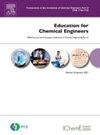Games in engineering: Exploring the use of spreadsheet-based Sudoku within a chemical process optimisation class
IF 2.3
2区 教育学
Q1 EDUCATION, SCIENTIFIC DISCIPLINES
引用次数: 0
Abstract
Game-based learning has long been recognised to facilitate learning through various ways such as improved motivation among students and improved cognitive skills (critical thinking, content understanding). Consequently, educators in different fields have incorporated various games into their teaching practice. Building on these efforts, this work sought to introduce spreadsheet-based Sudoku to a Chemical Process Optimisation course and to gather students’ feedback on the initiative. A 4 × 4 Sudoku problem was presented using two implementation methods (integer space formulation and binary space formulation) as part of a class-based tutorial. Thereafter, the students were tasked to solve a 6 × 6 problem using both approaches and a 9 × 9 problem using any preferred approach. The findings from the submitted assignment as well as responses to an exit questionnaire suggested that the initiative led to an enhanced interest while giving the students an opportunity to learn new skills. Furthermore, it was observed that the success of the students was not likely to be influenced by the problem size or the students’ familiarity (or lack thereof) with Sudoku or the relevant software platforms as long as adequate tutorials were given beforehand. Finally, it was observed that the students had a preference for and obtained better success with the binary space formulation though it was more involving in its setup procedure as compared to the integer space formulation. The former gave a linear programming problem that solved easier than the non-linear programming problem obtained using the integer space formulation.
游戏在工程:探索使用电子表格为基础的数独在化学过程优化类
长期以来,人们一直认为基于游戏的学习可以通过各种方式促进学习,例如提高学生的动机和提高认知技能(批判性思维,内容理解)。因此,不同领域的教育工作者将各种游戏融入到他们的教学实践中。在这些努力的基础上,这项工作试图将基于电子表格的数独引入化学过程优化课程,并收集学生对该计划的反馈。作为基于类的教程的一部分,使用两种实现方法(整数空间公式和二进制空间公式)提出了一个4 × 4数独问题。此后,学生们被要求使用两种方法解决一个6 × 6的问题,并使用任何首选的方法解决一个9 × 9的问题。从提交的作业和离职问卷的结果来看,这一举措提高了学生的兴趣,同时也给了他们学习新技能的机会。此外,我们观察到,只要事先给予足够的指导,学生的成功不太可能受到问题大小或学生对数独或相关软件平台的熟悉程度(或缺乏)的影响。最后,我们观察到学生更喜欢二进制空间公式,并获得了更好的成功,尽管它比整数空间公式更涉及其设置过程。前者给出了一个线性规划问题,比用整数空间公式求解非线性规划问题更容易。
本文章由计算机程序翻译,如有差异,请以英文原文为准。
求助全文
约1分钟内获得全文
求助全文
来源期刊

Education for Chemical Engineers
Multiple-
CiteScore
8.80
自引率
17.90%
发文量
30
审稿时长
31 days
期刊介绍:
Education for Chemical Engineers was launched in 2006 with a remit to publisheducation research papers, resource reviews and teaching and learning notes. ECE is targeted at chemical engineering academics and educators, discussing the ongoingchanges and development in chemical engineering education. This international title publishes papers from around the world, creating a global network of chemical engineering academics. Papers demonstrating how educational research results can be applied to chemical engineering education are particularly welcome, as are the accounts of research work that brings new perspectives to established principles, highlighting unsolved problems or indicating direction for future research relevant to chemical engineering education. Core topic areas: -Assessment- Accreditation- Curriculum development and transformation- Design- Diversity- Distance education-- E-learning Entrepreneurship programs- Industry-academic linkages- Benchmarking- Lifelong learning- Multidisciplinary programs- Outreach from kindergarten to high school programs- Student recruitment and retention and transition programs- New technology- Problem-based learning- Social responsibility and professionalism- Teamwork- Web-based learning
 求助内容:
求助内容: 应助结果提醒方式:
应助结果提醒方式:


